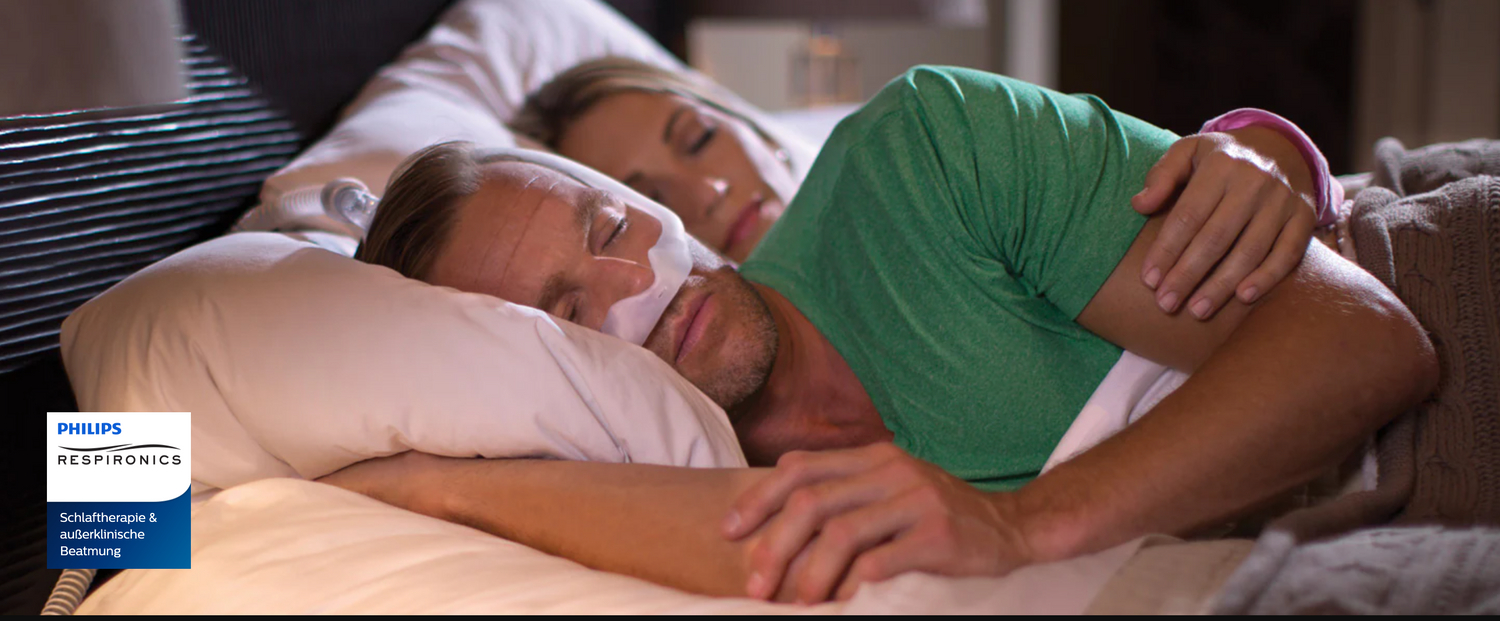
CPAP and BiPAP difference?
Teilen
Both CPAP and BIPAP ventilation are the most prescribed therapies for sleep apnea. Both forms of ventilation are based on positive pressure and continuously supply the patient with breathing air through a full or nasal mask during sleep at night. But what exactly is the difference?
Have you always wanted to know how the two ventilation methods differ and for whom CPAP or BiPAP is the better choice? In this article, you will also learn how sleep apnea can be treated without a mask and even permanently cured.
What do CPAP and BiPAP therapy have in common?
Before we delve into the differences between CPAP and BiPAP, let's take a look at the similarities of the two treatment approaches.
CPAP stands for Continuous Positive Airway Pressure.BiPAP stands for Bilevel Positive Airway Pressure. Both ventilation methods are non-invasive therapies for patients suffering from obstructive sleep apnea.
In terms of application, function, and effect, CPAP and BiPAP devices do not differ: Both CPAP and BiPAP supply sleep apnea patients with air at night through a full or nasal mask. The devices operate with positive pressure, which directs air directly into the airways. This positive pressure prevents the throat muscles from collapsing and prevents airway narrowing. When applied correctly, this positive pressure ventilation, also known as pneumatic splinting, stops the life-threatening nocturnal breathing interruptions. Snoring is also reduced by CPAP and BiPAP, and in some cases, it is even completely eliminated.
What are the differences between CPAP and BiPAP devices?
Although CPAP and BiPAP are identical in application through the mask, functionality, and opening effect, the two ventilation methods also differ in some aspects.
The most decisive difference is the air pressure. CPAP has only one air pressure setting, whereas BiPAP has two. This means a CPAP device exerts a constant pressure on the airways, while a BiPAP mask provides higher pressure during inhalation and lower pressure during exhalation. As a result, CPAP users need to exert more effort when exhaling compared to BiPAP users.
Who is CPAP ventilation suitable for?
CPAP is the standard therapy for severe obstructive sleep apnea. CPAP devices deliver a continuous, steady stream of pressurized air into the airways.A variation of air pressure is not possible with CPAP compared to BiPAP. However, many CPAP devices have a built-in ramp function. Such devices start with a low pressure setting and gradually increase it to the desired pressure setting. This comfort feature ensures that the pressure does not build up abruptly when falling asleep, making it more tolerable. Once the pressure reaches the set value, it remains constant throughout the night.
For whom is BiPAP the device of choice?
Due to their differences, CPAP and BiPAP devices are not prescribed to the same patient groups. BiPAP therapy is particularly often used when CPAP does not bring the desired success. However, for sleep apnea patients who require high air pressure settings or have particularly low oxygen saturation levels, BiPAP is the device of choice.
Additionally, this form of therapy can prove helpful in treating patients with cardiopulmonary diseases such as heart failure and is also frequently prescribed for patients with lung diseases like COPD or certain neuromuscular diseases.
What if I can't manage with either CPAP or BiPAP?
Nocturnal panic attacks due to fear of suffocation, limited mobility because of all the cables and hoses, and a deformed face upon waking are just some of the side effects of wearing a CPAP or BiPAP mask and reasons why the ventilation therapies for sleep apnea patients are not consistently followed through.
If you also find constant exhalation against air pressure difficult or if positive pressure ventilation is not an option for you for another reason, let us explain the "bimaxillary advancement" with CounterClockwise Rotation. The surgery, in which the upper and lower jaws are advanced, is the only causal therapy for sleep apnea. Compared to CPAP and BiPAP, the surgery not only alleviates the symptoms but also expands your airways, thus completely eliminating the cause of breathing interruptions during sleep. After the surgery, you will never have to wear a mask again and will finally be able to sleep through the night without breathing interruptions.

